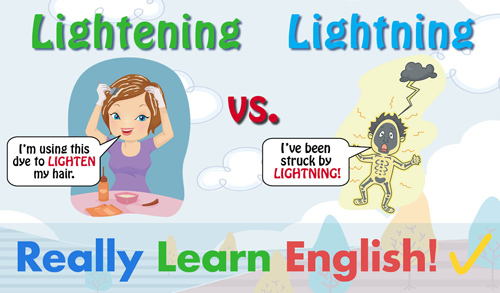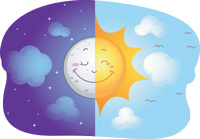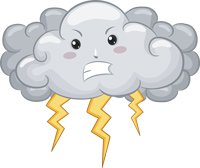Lightening vs. Lightning
What is the difference?
Lightening and Lightning are two English words which can be easily confused, because they are spelled and sound almost exactly the same. Let's examine the meanings of these two sound-alike words (homonyms), because that one little E makes all the difference!

Let's look at some examples to help you learn the distinction.
Click Here for Step-by-Step Rules, Stories and Exercises to Practice All English Tenses
First let's look at the root word, light. Light is an English word which may be either a noun or verb. The word has many meanings but is most often used as an opposite (antonym) to either dark; or to heavy.
Examples:
- The day is light, but the night is dark.

- A bucket of water is heavy, but a feather is light.

In its verb form, light means to ignite or start something that will reduce darkness.
Examples:
- In just a minute, he will light the fire.

- The morning sun through the east windows lights the whole room.

Both lightening and lightning are related to the word light.
Lightening
Lightening is the ING form of the verb "lighten" (reduce darkness or weight).
Lightening = Lighten + ING

As an ING form, "lightening", can act as a verb, noun, adjective or adverb. Lightening means making lighter (making less dark or making less heavy). Like the root word light, lightening can have many different meanings.
Examples:
- I wish Rhonda would stop lightening her hair; I like the natural color best.
Verb: removing or reducing darkness (color)

- One health benefit of weight loss is the lightening of the load on your knees.
Noun: reducing weight (load)

- Maria cares for her grandfather on Saturdays, lightening the load on her grandmother.
Adverb describing the verb, cares: reducing a weight (of responsibility)

- David walked to the window and opened the shutters, instantly lightening the room.
Adverb describing the verb opened: removing or reducing darkness (shadow)

- Lightening with the early morning, the sky had turned from black to grey.
Adjective describing the noun sky: becoming less dark

- The little boy smiled and took her hand, his mood lightening.
Adjective describing mood: becoming less heavy (sad)

Lightning
Lightning is an adaptation of the word lightening for a specific application related to thunderstorms. It is always a noun. Lightning is a brief, bright light visible in the sky between clouds and ground during a thunderstorm (a heavy rainstorm with thunder and lightning), so named because it can often bring light to the whole sky. The word Lightning does not appear in a plural form. For both singular and plural we use, simply, lightning.

Examples:
- We didn't get much rain during the storm, but that lightning was impressive!

- My dog hates storms; she is afraid of thunder and lightning!

- Whenever you see lightning, thunder is sure to follow!

Tips
Lightening is a verb (ING form of the verb lighten, meaning "make less heavy" or "make less dark") which can also be used as an, adjective, adverb, or noun.
Lightning is always a noun but never appears in plural (with the -s ending).
Remember, lightENing means reducing darkness or color -- or reducing weight or heaviness. LightNing refers to bright light in the sky during a thunderstorm.

Note: A very similar and related word in English is enlightening, which means decreasing ignorance or confusion or increasing knowledge or understanding.

This word gives us a hint about another meaning of the word light. Light sometimes means understanding, or insight (note the relationship between sight and light).
Examples:
- I found professor Solomon's lecture today to be most enlightening.
Last night I couldn't understand the lesson, but today I have seen the light! - Dr. Young enlightened me in my understanding of physics.
His class definitely brought some new information to light! - Yesterday's meeting enlightened me as to the status of our project.
I thought we were on schedule, but John and Palmyra brought some problems to light.
A Story to practice Lightening vs. Lightning
It is night, and a storm is coming through our neighborhood. The thunder is so loud and lightning so bright! My dog is terrified, even though she lives indoors. I can hear the wind blowing against my house. The lightning is lightening the whole sky, so that during some brief moments it looks like day outside! There is a huge "crack" of thunder as the wind continues to blow and the lightning makes it's crooked streaks through the sky. I hope that the wind will be lightening soon. It sounds dangerous!
My husband runs out into the rain and lightning to try to move his truck farther into the carport, in case of hail (pieces of ice falling from the sky). "Don't go out there!" I say, but he doesn't listen. He is more afraid of hail damaging his truck than of lightning. He makes me nervous. Soon he returns safely through the storm, lightening my worries considerably.
Eventually the heavy rain begins lightening to a more moderate rainfall, the thunder and lightning move along to our east, and the worst of the storm is over. I am thankful for the rain, but I am glad the wind and lightning are past.

Quiz
Answer the following questions and then check your answers below.
Each question is worth eight and one third points.
- The word lightening is?
- conjunction
- an infinitive of the verb lighten
- the ING form of the verb lighten
- a preposition
- The word lightning is?
- A noun
- A verb
- An adjective
- All of the above
- As an ING form, the word lightening can also be?
- A noun
- A verb
- An adjective
- All of the above
- Which of the following is a correct definition of lightening?
- brightening.
- reducing color.
- reducing darkness.
- all of the above.
- Which of the following is a correct definition of lightning?
- a loud noise during a thunderstorm.
- reducing weight or heaviness.
- a bright streak of light during a thunderstorm.
- making less dark.
- Which of the following is a correct definition of lightening?
- making darker.
- making heavier.
- making less heavy.
- making worse.
- Which of the following is written correctly?
- I don't mind thunder, but I am afraid of wind and lightening!.
- Raphael told a joke, lightening the mood in the conference room.
- I think Maria is lightning her hair; it looks different.
- Ginny emptied three books out of her bag, considerably lightning her load.
- Which of the following is written incorrectly?
- That tree was damaged by lightning in the spring.
- Jorge had his office repainted from brown to tan, lightening the whole room!
- I reduced the sugar and the butter by half, considerably lightening the recipe.
- The winds blew, the lightening streaked, and the thunder roared!
- Rolph puts 5 tablespoons of milk in his coffee, _____________ it almost to white!
- lightening.
- lightning.
- Marla isn't coloring her hair; she is just _____________ it.
- lightening.
- lightning.
- As we travelled through the night, we saw streaks of _____________ in the sky all around us.
- lightnings.
- lightning.
- _____________ the load on her feet, she kicked off her shoes and fell into the soft sofa.
- lightening.
- lightning.
Answer Key
1. C | 2. A | 3. D | 4. D | 5. C | 6. C | 7. B | 8. D | 9. A | 10. A | 11. B | 12. A
Get Updates, Special Offers, and English Resources
Download your FREE GIFT (the first two chapters of
English Short Stories Book and Workbook)
as soon as you join!

By submitting your email, you consent to receiving updates and newsletters from us and to the sharing of your personal data with third parties for the purposes of sending you communications. We will not spam you. You can unsubscribe at any time. For more information, please see our privacy policy.





